The White Bohemian rebellion and other hostilities in the spring-summer of 1918
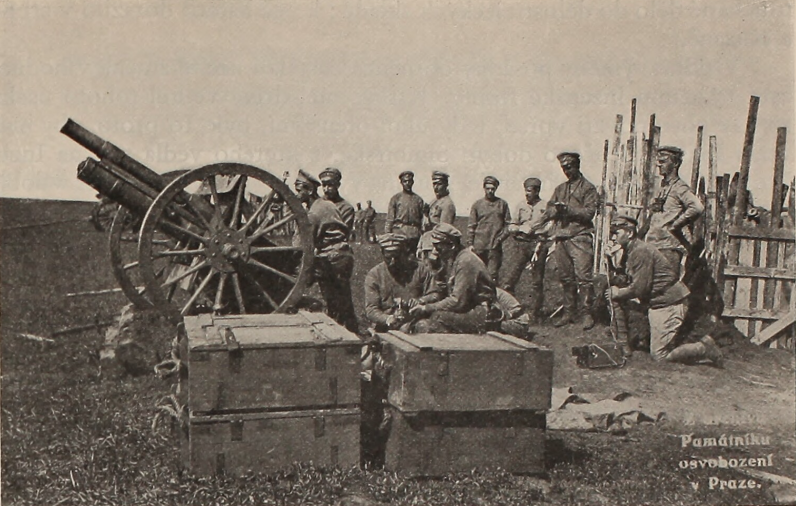
The first battery of the Czechoslovak corps named after Jan Zizka from Trocnov in the battles for Bezenchuk. June 1918
The work of the hand ...
We’ll fill the cartridges ourselves
Screw the bayonets to the guns.
“Bravely, comrades, keep pace,” words by Leonid Radin.
The lyrics of the song were printed in the legal edition
back in 1914 in the Bolshevik newspaper “The Path of Truth” (No. 75).
Unknown Wars. In the previous material about the White Bohemian uprising there were many pictures, or rather photographs. This material, as promised, will contain excerpts from the Izvestia newspaper. From them we will try to find out what information about current events Russian citizens received in 1918. But first we should give some information based on our current knowledge.
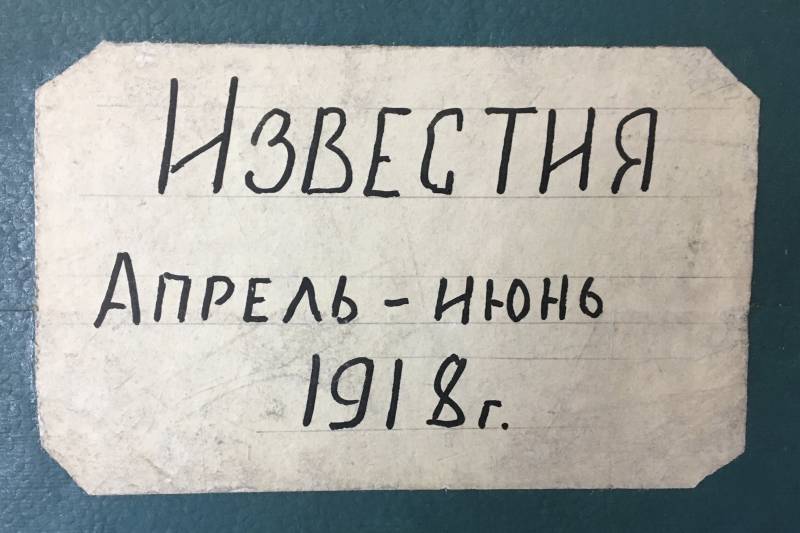
Here it is - the cover of the Izvestia newspaper binder from the funds of the Penza State Archive!
So, the Czechoslovak corps was formed on the territory of the Republic of Ingushetia from prisoners of war of the Austro-Hungarian army of the corresponding nationalities, armed with Russian weapons and was used on the Eastern Front of the First World War. The incentive was the promise after the victory to help create a Czechoslovak state independent from Austria and Hungary. The corps supported the October coup, which was enthusiastically written about by all Soviet newspapers and in particular Pravda.
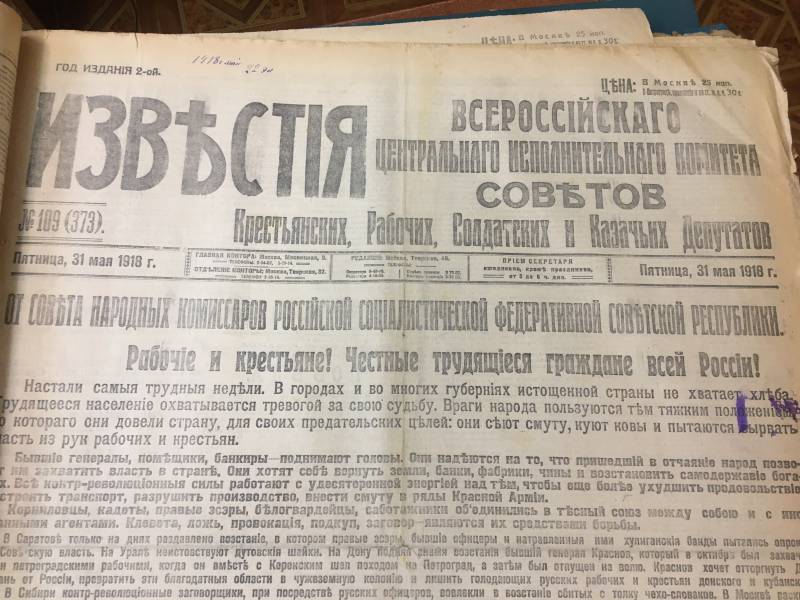
And here is the appeal of the Soviet government on May 31. As you can see, the difficulties facing him and the country at that time were simply enormous!
But on March 3, 1918, an agreement was signed in Brest-Litovsk between Germany, Austria-Hungary and Turkey on the one hand and Soviet Russia on the other. Not everyone understood that this was a forced measure, but the terms of the agreement that gave peace to exhausted Russia were very difficult. Soviet Russia was losing control of Ukraine, Poland, Belarus, its Baltic provinces (now Lithuania, Latvia and Estonia) and its Caucasus provinces of Kars and Batum. These lands accounted for 34% of the population of the former empire, 54% of its industrial potential, 89% of coal deposits and 26% of railways.
The amount of reparations was set at 300 million rubles. The sale of 25% of the production of the Baku oil fields to Germany was also agreed upon. Three secret clauses of the treaty (this is despite the already declared rejection of secret diplomacy!) allowed Germany to act with armed force against the Entente forces on Russian territory, as well as British troops from Baku.
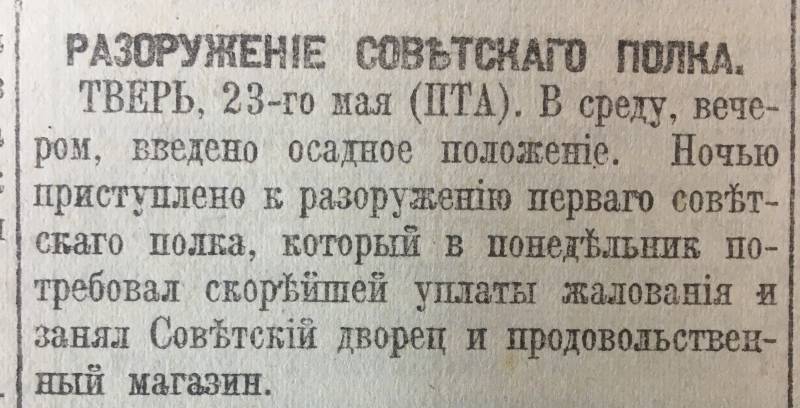
It is interesting that at that time it was necessary to disarm not only the Czechs, but also the Soviet regiments. The reason... non-payment of wages, and hence dissatisfaction with the authorities, which should not have been allowed
The agreement also provided for the exchange of prisoners of war, that is, the return to the active army of Germany and Austria-Hungary of a large number of soldiers of the Quadruple Alliance captured by Russia. It is clear that the Entente did not want all this. After all, no one could have foreseen the revolution in Germany at that time.
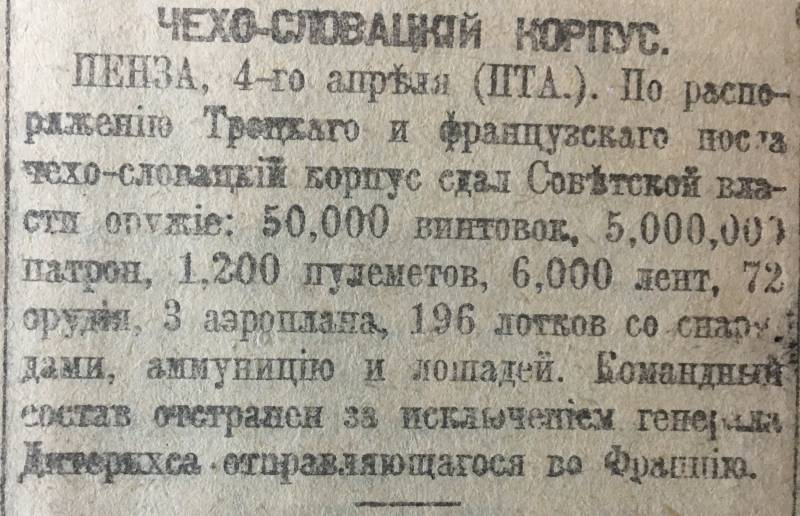
Information from Penza
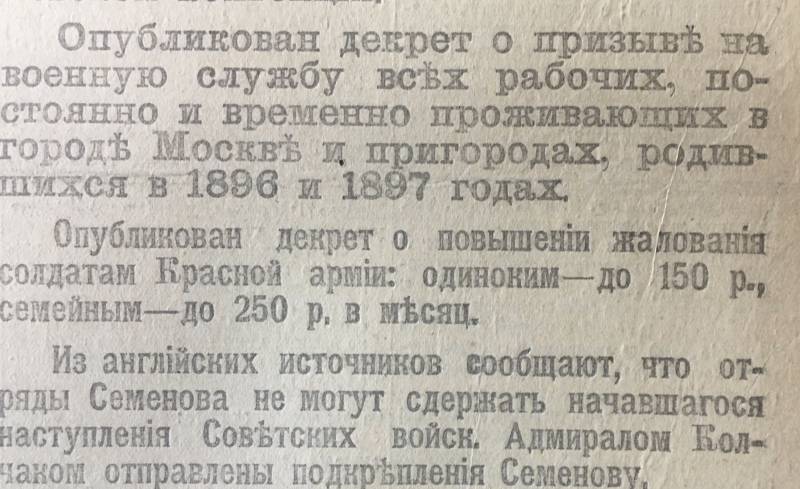
Decree on conscription into the army
Meanwhile, from March 7 to March 14, in the Bakhmach region, the Czechoslovaks, together with the Soviet troops, fought against the Germans, ensuring the evacuation of Soviet institutions and refugees. At the same time, the leadership of the corps offered the Soviet government to allow him to travel to France through Vladivostok.
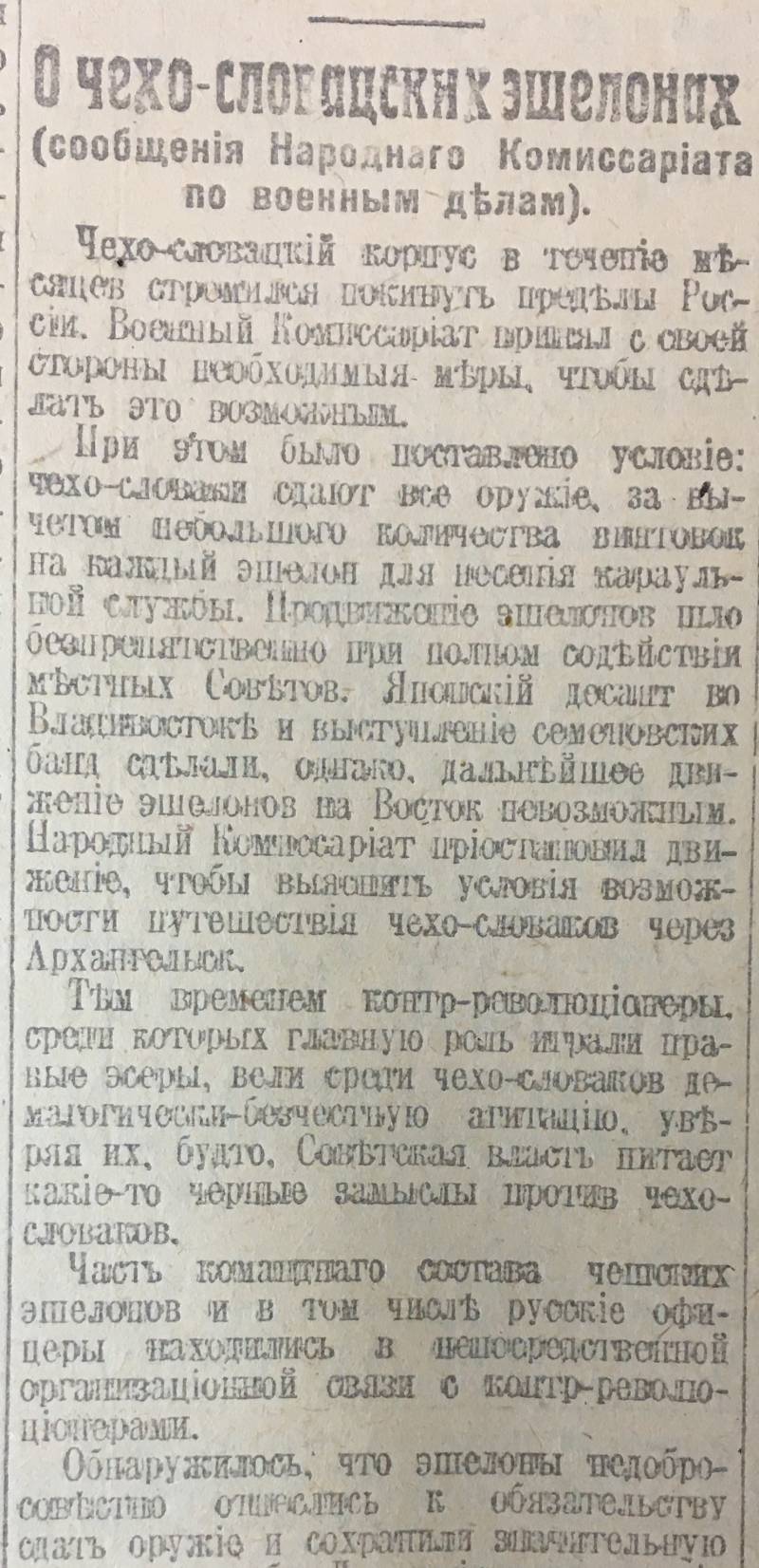
A note that the Soviet government does not harbor any dark intentions regarding the Czechoslovak corps...
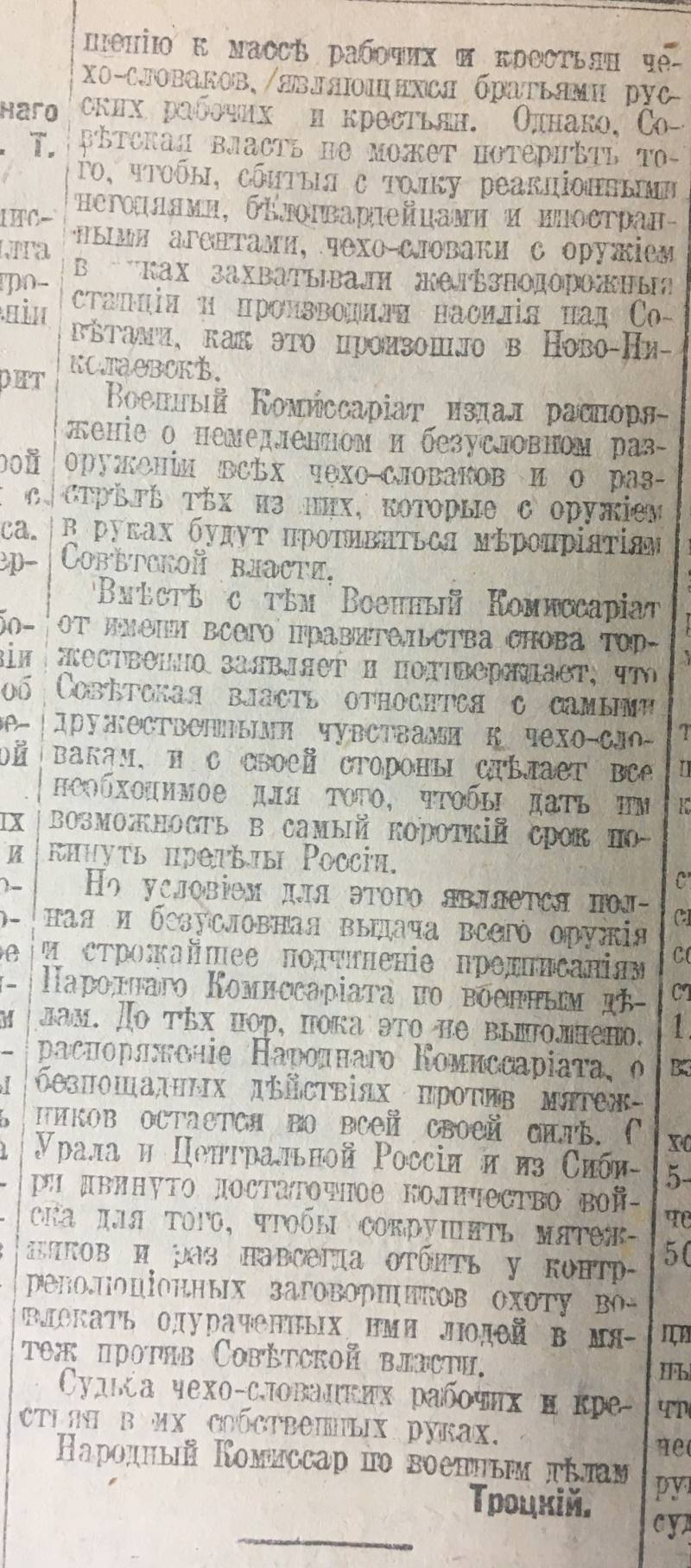
Trotsky signed newspaper articles with one hand. Another... an order to disarm the corps and send Czechoslovaks to prisoner of war camps. Politics, however...
But then the Soviet government became aware of the secret negotiations of the allies regarding the Japanese landing in Siberia and the Far East. Therefore, on March 28, in order to prevent him, Leon Trotsky gave Lockhart consent to land an all-Union landing in Vladivostok. But on April 5, Japanese Admiral Kato landed a small detachment of marines in Vladivostok “to protect the lives and property of Japanese citizens” without notifying the allies.
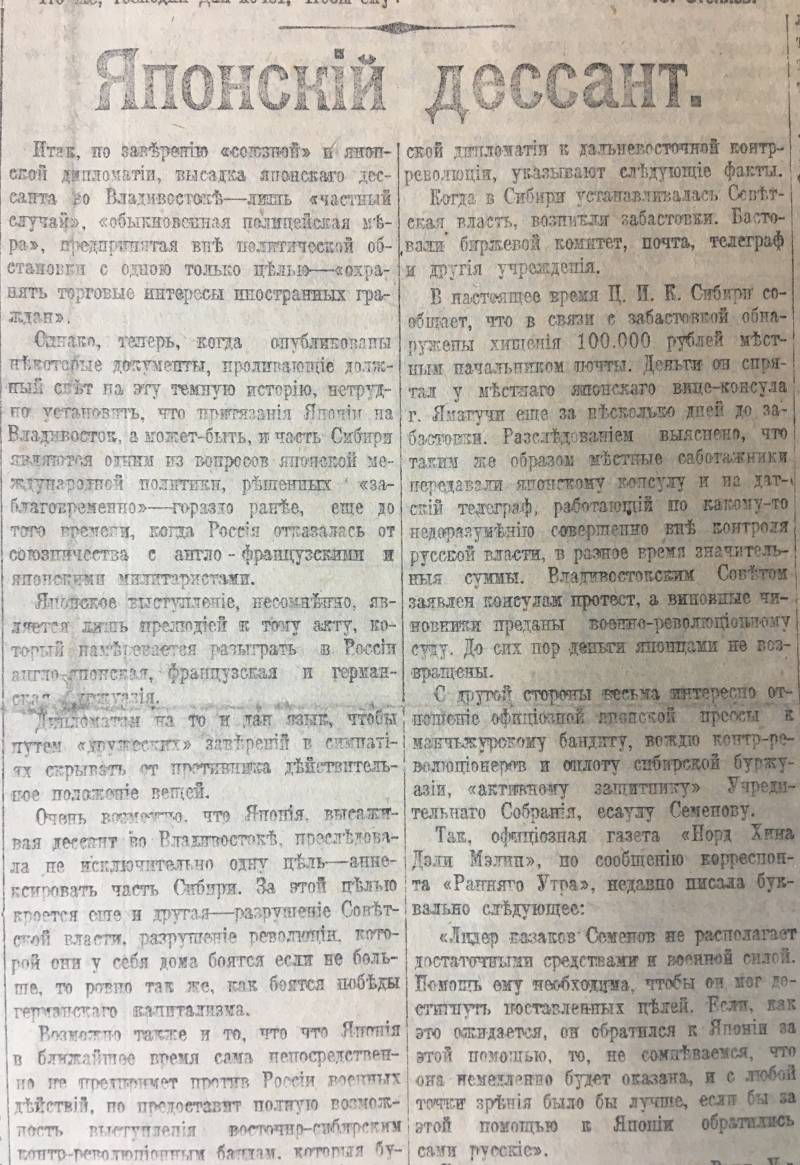
"Japanese landing force." Then they wrote like this
The Soviet government, suspecting the Entente of a double game, demanded that negotiations immediately begin on the evacuation of the Czechoslovaks through Arkhangelsk and Murmansk instead of Vladivostok. Germany, of course, was also not happy about their imminent arrival on the Western Front. Therefore, the German Ambassador to Russia, Count Mirbach, sent a note to the Soviet government demanding that the corps be disarmed and, in fact, interned on Russian territory. This was the price for peace with the Germans.
And on April 21, People's Commissar for Foreign Affairs G.V. Chicherin sent a telegram to the Krasnoyarsk Soviet, ordering further movement of Czechoslovak trains to the east to be suspended:
Chicherin
The corps, however, continued to move in the direction of Vladivostok, therefore, on May 25, a telegram from Commissar Trotsky “to all Soviet deputies along the line from Penza to Omsk” followed, which left no doubt about the determination of the Soviet authorities to first disarm the Czechoslovaks, and then, to please the Germans, again turn them into prisoners of war.
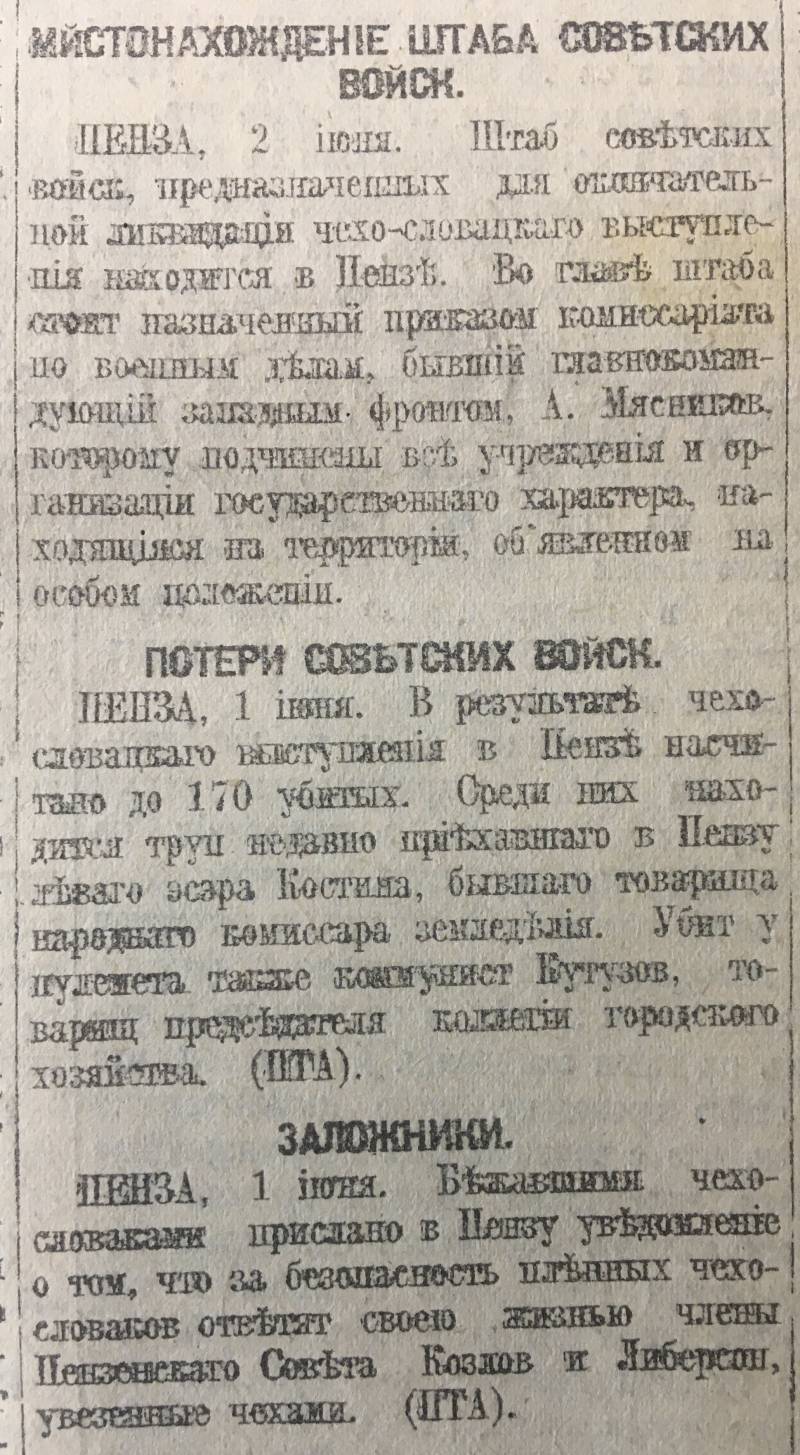
The rebel legionnaires stayed in Penza for two days and moved on. Here is a message from Penza on June 2
The result was an uprising of the Czechoslovak corps from Penza to Vladivostok. The uprising of the corps allowed the forces of counter-revolution to unite. In particular, the government of Komuch (the Committee of Members of the Constituent Assembly) was created in Samara and, in fact, the first leadership of the White Guards in Russia opposed to the Bolsheviks. And this despite the fact that the People's Army of Komuch fought under the revolutionary Red Banner!
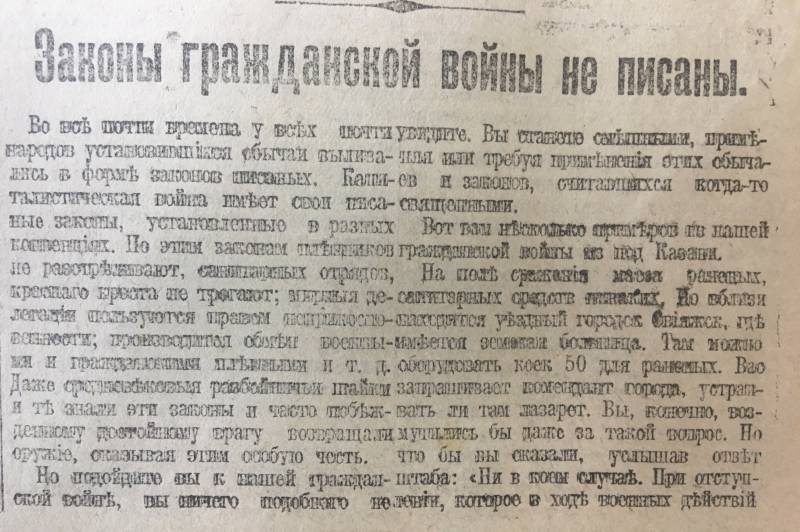
The first mention in Izvestia of the Civil War...
Already on July 10, its fighters under the command of Lieutenant Colonel Kappel re-took Syzran, and Chechek’s legionnaires captured Kuznetsk on July 15. On July 22, Kappel’s troops made their way through Bugulma to Simbirsk and then, together with the Czechoslovaks, went to Saratov and Kazan. On July 25, in the Urals, Colonel Voitsekhovsky occupied Yekaterinburg. In the east, General Gaida occupied Irkutsk on July 11, and later Chita.
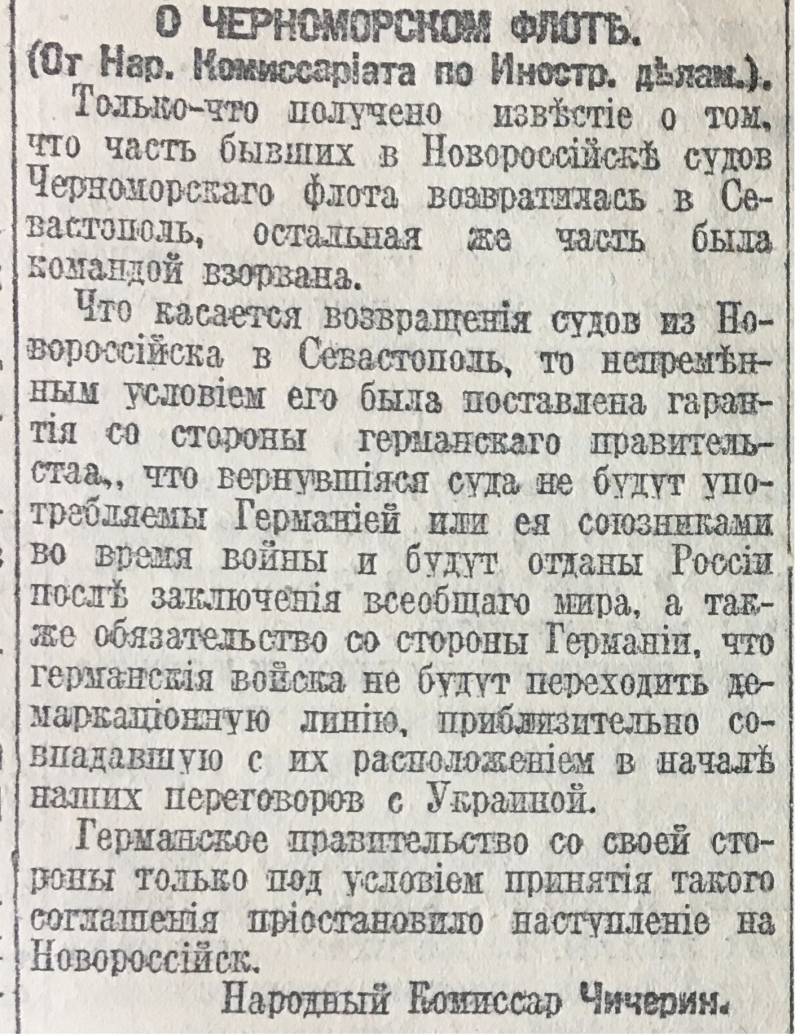
The price for stopping the German offensive on Novorossiysk was the Black Sea Fleet...
But then the superior forces of the Red Army recaptured Kazan from the People’s Army on September 10, then Simbirsk on September 12. At the beginning of October, Syzran, Stavropol and Samara were taken. In the Czechoslovak legions themselves, uncertainty grew steadily that it was they who needed to fight in the Volga region and the Urals.
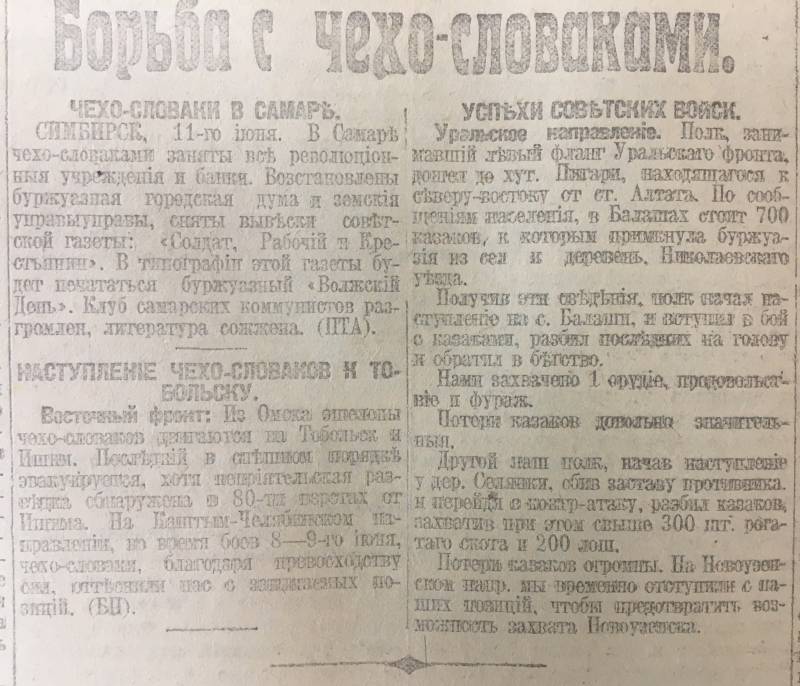
June 11 – “Fight against the Czechoslovaks”
It should be noted here that it was the Brest-Litovsk Peace Treaty, which became the prologue to the uprising of the Czechoslovak corps, that marked the advent of an era of open political pragmatism, that is, something that before that they at least somehow tried to veil. However, like any cynical and exclusively pragmatic “deed,” this agreement, by and large, did not bring much benefit to anyone. The losses of the Soviet side have already been mentioned here. But it didn’t bring much peace to it either: the White Bohemian rebellion began, White Guard gangs became more active, so the young republic still had to fight.
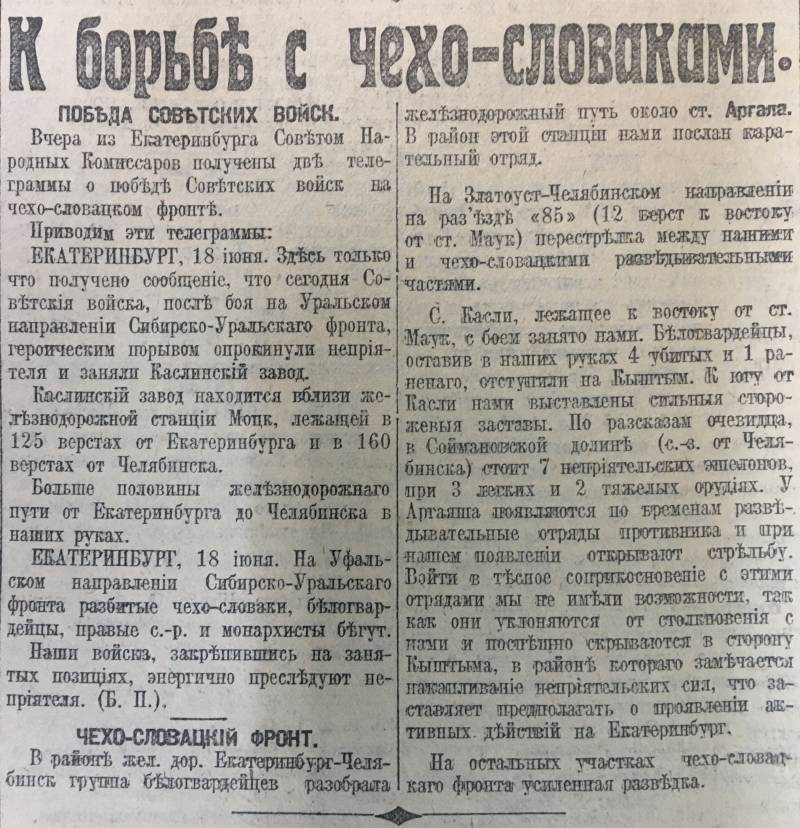
June 18 – “Towards the fight against the Czechoslovaks”
Accordingly, the Germans, having received a huge piece of the Russian Empire, were forced to keep numerous troops here, which ultimately never made it to the Western Front. The losses they suffered in battles on the territory of Ukraine were also significant. Many soldiers were promoted and became active participants in the November Revolution in Germany.
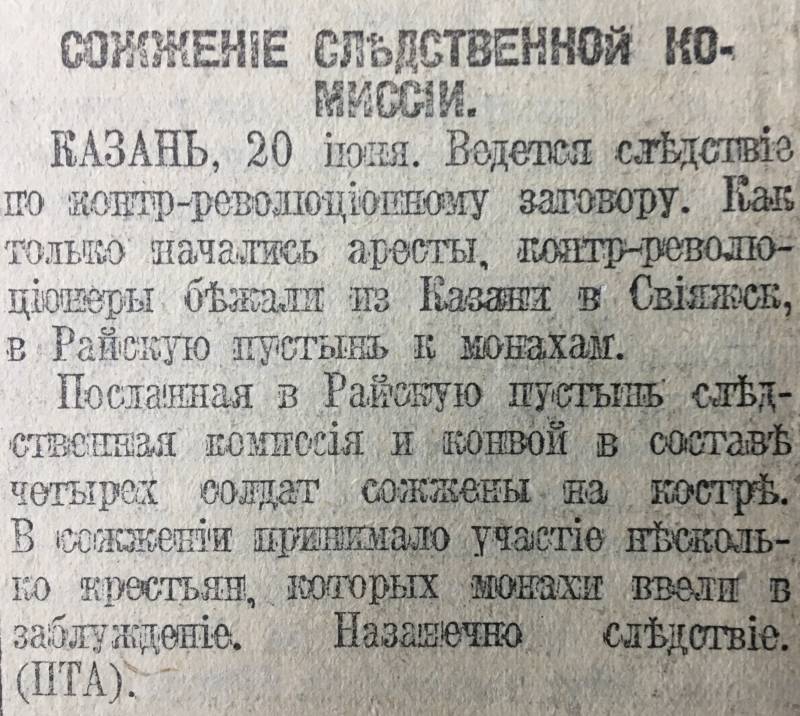
Burning of the commission. The realities of the Civil War...
In turn, the uprising of the corps blocked a huge number of German-Austrian prisoners of war in Siberian camps, who never appeared on the Western Front, which facilitated the victory of the Entente. Moreover, now the Soviet government had every reason to justify itself to the Germans for failure to comply with the clauses of the Brest-Litovsk Treaty regarding the release of prisoners of war. For they did not have the power to do this in territories controlled by the Czechoslovaks. True, we can say that it was the Czechs who raised the Omsk ruler Kolchak, but they also sold him to the Irkutsk Revolutionary Committee (and along with the gold reserves!), thus bargaining for themselves the right to leave Russia.
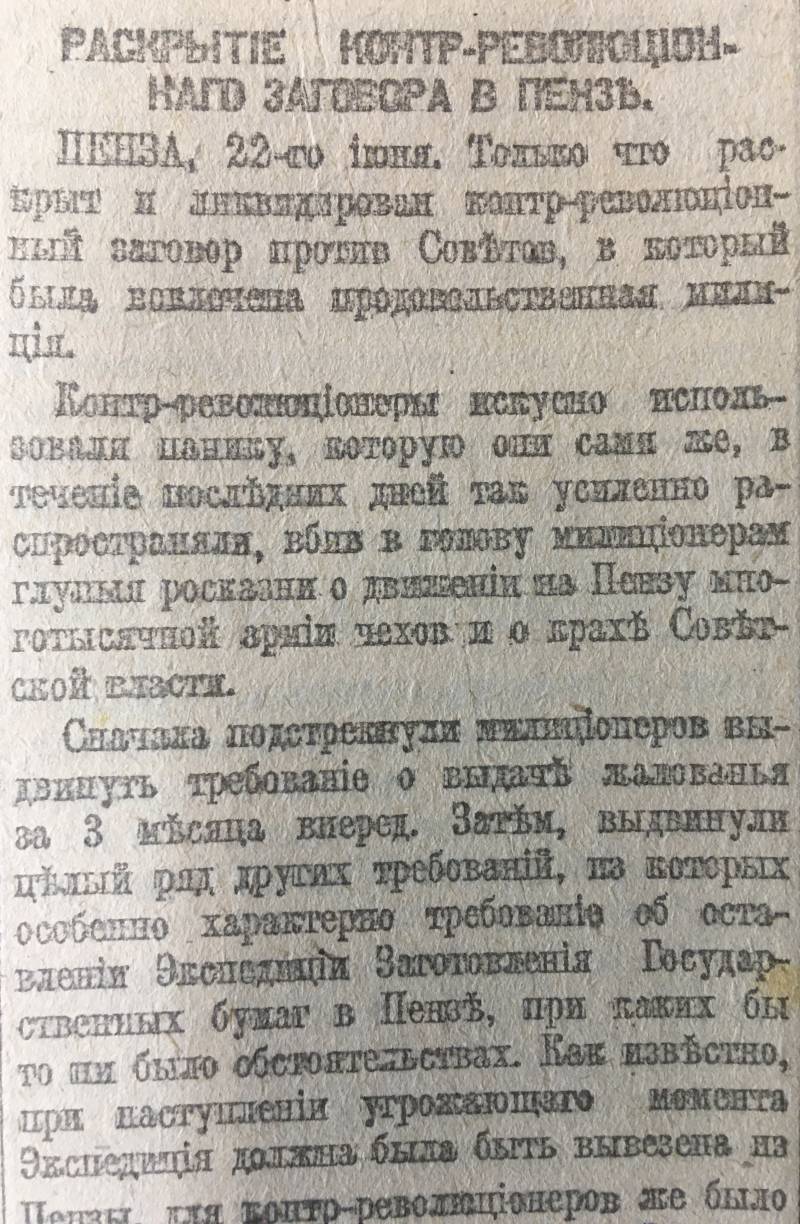
22nd of June. No sooner had the Czechs left Penza than a conspiracy immediately matured there!
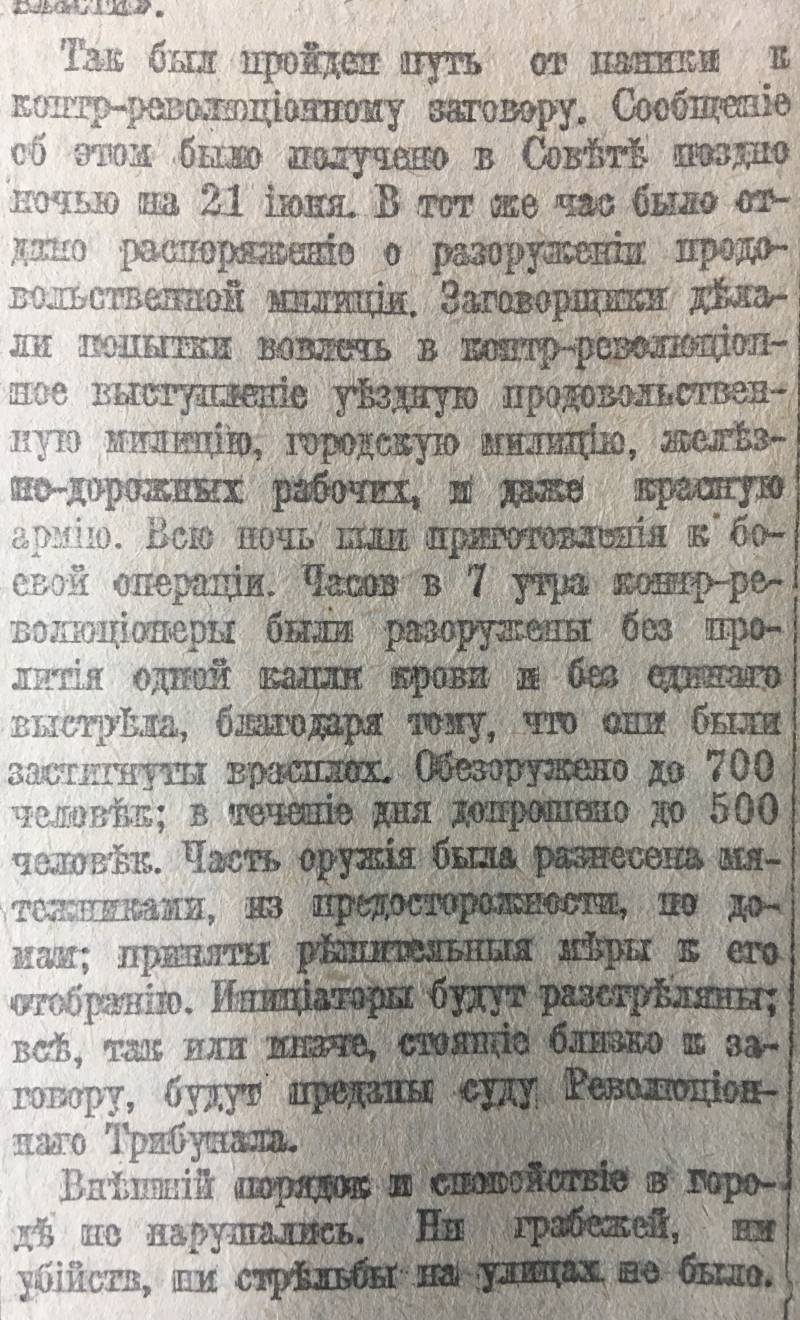
Conspiracy in Penza. Continuation
Finally, what benefit did the Czechoslovak corps itself receive from the armed uprising on Russian territory?
Well, firstly, during their stay in Russia, the Czechs and Slovaks set up a lot of different enterprises. Beer and sausages were produced. But the main thing is that they loaded into their echelons everything that their hands could reach. Non-ferrous and ferrous metals (including door handles), rolled metal, hemp, leather, lard, flax, furs, gold - all this could be found in abundance on the trains heading east. The Legionary Bank was created. The corps participated in battles in such a way as to suffer minimal losses. Many legionnaires managed to acquire wives and children during their stay in Russia.
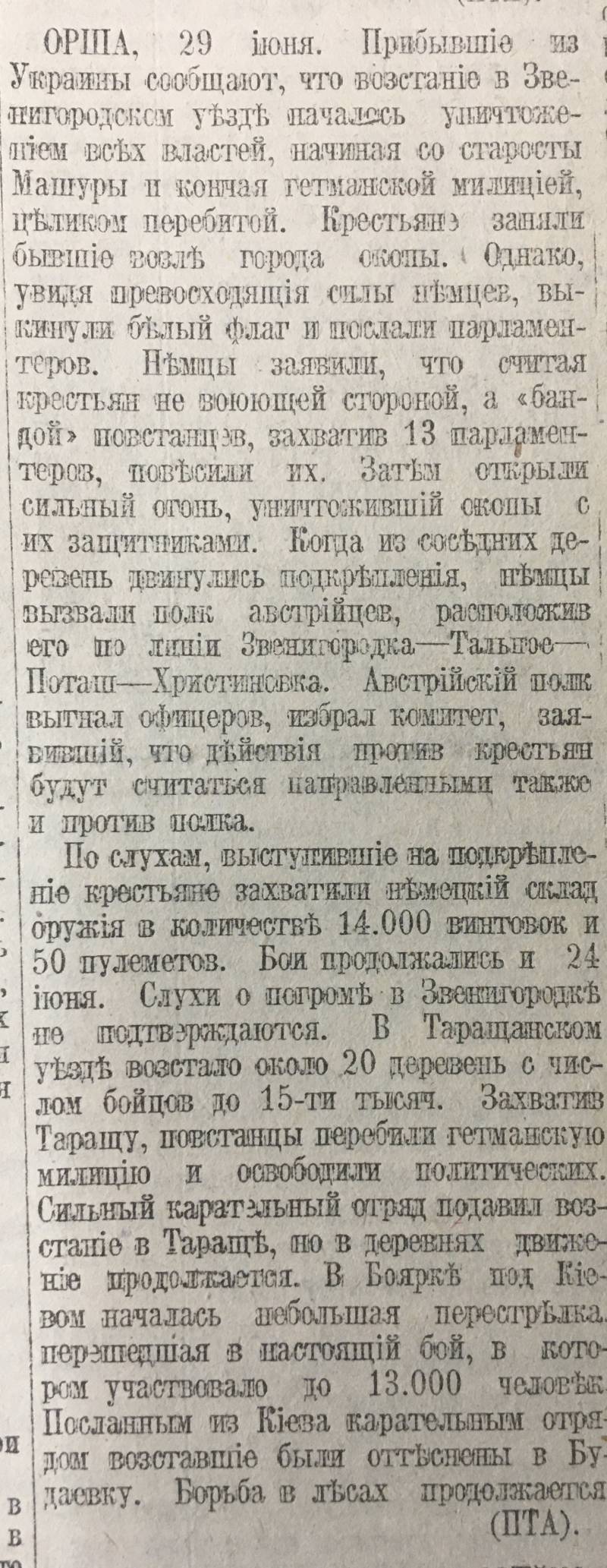
Fighting in the forests near Orsha...
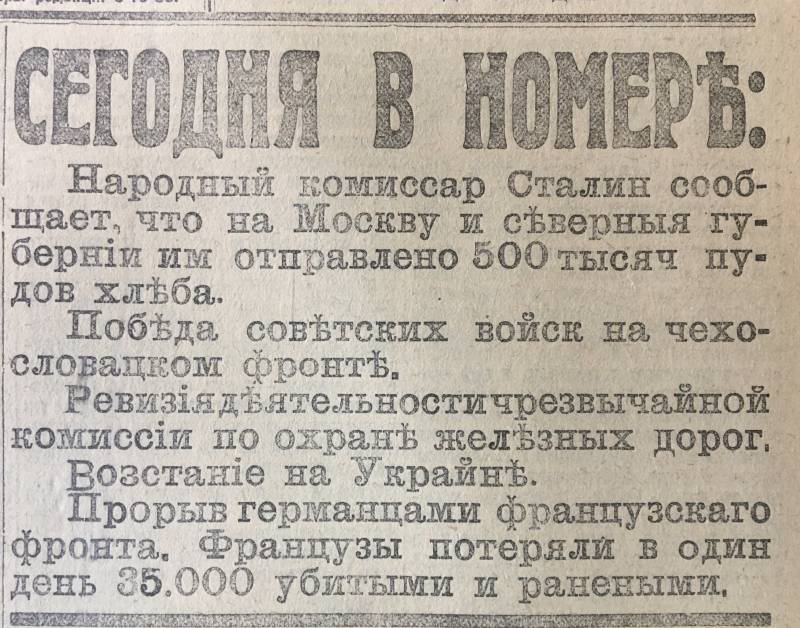
Quite a modern announcement!
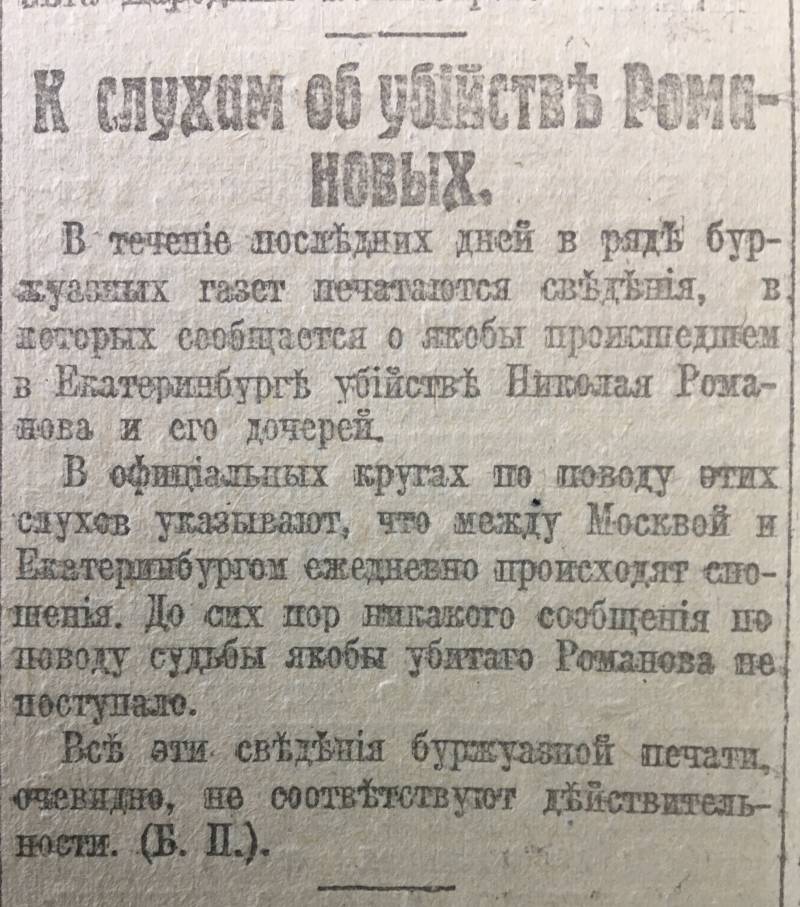
The rumors about the murder of the Romanovs are not true... But they were true... Then Izvestia will have to write about it! This is like the case of the Japanese plane in 1980, which went towards the sea. There is no way to immediately say: “The border is locked.” Briefly and clearly. And it exudes strength and confidence in its right. But no...
So, significantly more people left Russia on Czech trains than were in the corps at the start of the mutiny! And, perhaps, this rebellion can be considered one of the most profitable... economic enterprises of the early twentieth century. Namely, the legion, which returned to the created Czechoslovakia, brought such values to it that it did not experience all the difficulties that the defeated Germany and Austria experienced, and quickly became one of the most developed states of post-war Europe!
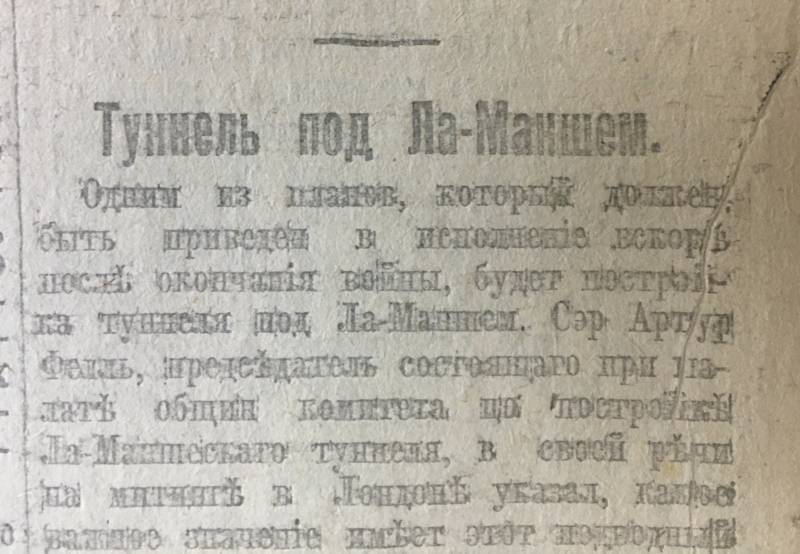
There was a place in the newspaper in order to write about the project of the tunnel under the English Channel. And why not publish it if they wrote about it? It's interesting indeed. War is war, but the achievements of science and technology are... pleasing!
To be continued ...
Information